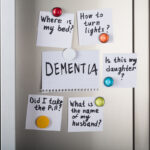
Clarissa Giebel reviews a recent study exploring the impact of auditory hallucinations on ‘living well’ with dementia using findings from the IDEAL programme.
[read the full story...]
Clarissa Giebel reviews a recent study exploring the impact of auditory hallucinations on ‘living well’ with dementia using findings from the IDEAL programme.
[read the full story...]
Rosie Mansfield summarises recent findings from the IDEAL programme on the prevalence and determinants of loneliness in people living with dementia.
[read the full story...]
Eleana Frisira writes her debut blog on a recent 3-year longitudinal study exploring the burden that falls on caregivers of people with various types of dementia.
[read the full story...]
Remco Tuijt writes his debut blog and summarises a recent scoping study on dementia friendly communities in England: what they are and what they want to achieve.
[read the full story...]
Marie Crabbe presents the findings of a mixed-methods systematic review, which looks at General Practitioners’ knowledge, attitudes and experiences of managing behavioural and psychological symptoms of dementia.
[read the full story...]
Clarissa Giebel unfolds and reviews a new roadmap to advance dementia research in prevention, diagnosis, intervention and care by 2025.
[read the full story...]
Hilary Shepherd examines a qualitative systematic review that aimed to present all available descriptions of emotional distress and explanations for emotional distress experienced by people with dementia, articulated personally and by others.
[read the full story...]
Hilary Shepherd writes her debut blog on a new paper from the WHELD cluster RCT, which looks at the impact of antipsychotic review and psychosocial intervention on health-related quality of life in people with dementia living in care homes.
[read the full story...]